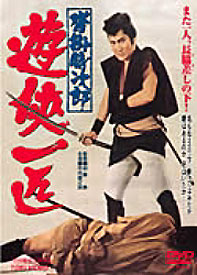 "Kid" Yata of Seki is a recurrent character in chambara films, from a popular play by Shin Hasegawa (1884-1963) best known for his matatabi-mono or "wanderer tales" & plays, with dozens of films based on sundry of his stories about chivalrous commoners. Yatappe has also found his way into anime & manga. "Kid" Yata of Seki is a recurrent character in chambara films, from a popular play by Shin Hasegawa (1884-1963) best known for his matatabi-mono or "wanderer tales" & plays, with dozens of films based on sundry of his stories about chivalrous commoners. Yatappe has also found his way into anime & manga.
Kasuto Yamashita directed Seki no Yatappe (Toei, 1963) which has been shown with subtitles under the English titles Killer Yatappe, Yatappe the Killer, Yakuza of Seki, & the misnomered Samurai & Orphan (Kid Yata is not a samurai).
Yata carries one sword, wears a sedge-hat, & travels through Japan being a good guy in the classic mode of a late-medieval yakuza hero, though he develops a grimmer streak than most chivalrous gamblers when life proves too harsh.
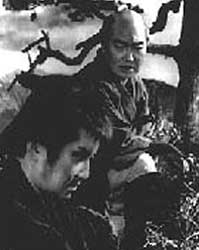 As the story opens, an eleven year old girl has fallen into a raging river. A passing traveler, Kid Yata (Kinnosuke Nakamura), leaps in & rescues her. As the story opens, an eleven year old girl has fallen into a raging river. A passing traveler, Kid Yata (Kinnosuke Nakamura), leaps in & rescues her.
He chastises the father who was not keeping a good eye on his daughter. Yata admits he has a soft heart for girls her age because of his own sister, Oita, who vanished ten years before when still a little girl.
Yata has saved fifty ryo of gold which he intends to give Oito as dowry if she has been living a straight life, or which he will use to redeem her if she has been forced into prostitution.
The father of the girl who fell in the river turns out to be a thief who steals Yata's fifty ryo. Another robbed traveler cuts down the father & takes the gold. Yata is left with the orphaned girl Osaya, who he takes to her grandparents, promising to provide them with ten year's expense (fifty ryo) as soon as he finds his stolen gold.
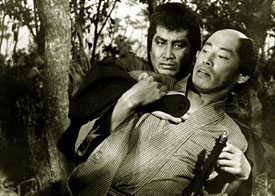 Soon he finds the other traveler, who turns out to be relatively honest & returns the money at once, saying he was surprised that after he regained his own stolen money from a thief, there were fifty extra pieces of gold. Soon he finds the other traveler, who turns out to be relatively honest & returns the money at once, saying he was surprised that after he regained his own stolen money from a thief, there were fifty extra pieces of gold.
Yata is pleased to find a man of apparent honesty & they drink from a well together, swearing brotherhood.
He sneaks back to Osaya's grandparents' house & leaves the money in secret, feeling good about his generous deed, certain he can earn the amount again for his own sister's sake.
Following a lead about his sister, Yata is stricken to learn Oito died in a brothel, having lived a terrible life. It changes Yata to realize he spent ten years searching hard, only to find a grave.
The story leaps ten years forward when Kid Yata has become Killer Yata, who will deliver any head for the price of one ryo. He has acquired a scar over the years & his visage is hardened. A matron of a teahouse says, "He looks scary, but is good at heart." He never got over findingt out his sister died & his life has been a cruel one ever since.
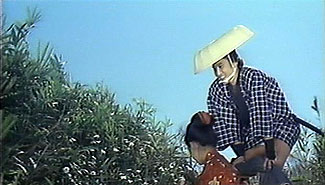 He's hired to kill a seventy year old man, who turns out to be a friend (Ryunosuke Tsukigata who plays Musashi in Hiken). He's hired to kill a seventy year old man, who turns out to be a friend (Ryunosuke Tsukigata who plays Musashi in Hiken).
The good in Yata resurfaces & he refuses to complete his commission, thereby earning the enmity of the gang who hired him.
Over drinks, the aged friend tells Yata & his sworn-brother of a young woman in a certain town who is a great beauty but refuses to accept any proposal of marriage, because she waits for the return of a wanderer who helped her ten years earlier.
Yata pretends to know nothing about it. His sworn brother, however, soonafter decides to go to the village pretending to be the girl's savior from ten years before. He wants only a reward but after meeting the beautyh demands a marriage, negver letting on that he was in fact the murderer of the girl's father.
Killer Yata returns to convince his sworn brother to leave the village & stop troubling the girl, whose dreams were shattered to think her childhood savior was such a rude self-serving greedy gambler.
 His sworn brother refuses & goes so far as to demand a duel. Yata reluctantly agrees, sadly killing his friend. His sworn brother refuses & goes so far as to demand a duel. Yata reluctantly agrees, sadly killing his friend.
The girl slowly comes to realize it was Yata who helped her ten years before. But he runs away from the promise of happiness at her side, from guilt for having killed even his own friend.
He knows his life is too ugly to share with a decent woman. Besides, he has to keep an arranged meeting with the gang that has finally tracked him down.
There is a lighthearted style to many of the wanderer films that Toei Studios produced, as they are intended to be family films & have happy endings. Many a viewer is apt to wonder at this point how Yatappe can possibly come away from a one-against-all battle with the yakuza gang & make any claim to a decent citizen's life having killed so many.
Toei company scripts do often trump up happy endings from nowhere even after intense incidents, but in this case the story sticks to a degree of logic within its own context. Killer Yatappe's fate is left to the viewer's imagination. Perhaps he survived the one-against-all battle, perhaps not. But either way, he has avoided the girl who waited for him, & he will live or die a wanderer, a loner, a gambler, a rootless killer.
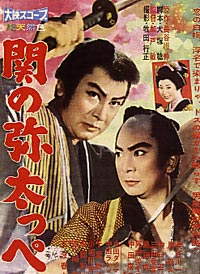 One of the earliest films to tell this tale was Seki no Yatappe (1939) was co-directed by Hiroshi Inagaki & humanist filmmaker Sadao Yamanaka. One of the earliest films to tell this tale was Seki no Yatappe (1939) was co-directed by Hiroshi Inagaki & humanist filmmaker Sadao Yamanaka.
Alas that version did not survive the war, nor does the still earlier Seki no Yatappe (1930) directed by Tetsuroku Hoshi & starring Kazuo Hasegawa as the Yatappe Kid.
But Satoshi [Bin] Kado's Seki of Yatappe (Seki no Yatappe, Daiei, 1959) survives, with Kazuo Hasegawa reprising his 1930 performance, & co-starring Shintaro Katsu.
 Hasegawa's take on Yatappe makes has a lot of focus on the little girl who waits ten years for the return of her childhood savior. When at last he shows up to save her once again, seeing how beautiful she has become. Hasegawa's take on Yatappe makes has a lot of focus on the little girl who waits ten years for the return of her childhood savior. When at last he shows up to save her once again, seeing how beautiful she has become.
She remembers him from her childhood & is glad her rather imaginary shining knight has at last returned.
But knowing what a wastral he has been in his life, & will continue to be, he adamantly denies being the man she remembers, & they part forever.
The Yata Kid also appears in Kenji Misumi's The Two Bodyguards (Nihiki no yojimbo, Daiai, 1968) with Kojiro Hongo as Seki no Yatappe & Isamu Nagato as his sworn brother Morisuki, who will become each the "friendly nemesis" of the other.
This version is not the equal of the classic starring Kinnosuke, but it's a fun film in its own right. It's light-hearted approach is sometimes closer to slapstick than human comedy. The melancholy streak demanded by the plotline becomes subjugated to humor, especially in the first half of the film. By the time the story begins to take itself seriously, it's a bit late for the viewer to want to take it seriously.
Okiyo (Miyoko Akaza) has run away from a brothel. Yata & Morisuki end up assisting her, & both men fall in love with her. They make a wager which Morisuke loses, thus sets out unhappily on his own, leaving Yata to court Okiyo, not that their relationship is apt to last long.
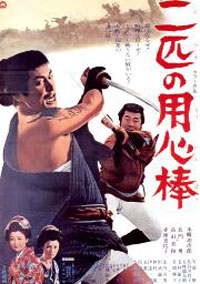 Morisuke adventures for some while on his own. Along the road he helps a little girl, getting her safely to her father. Ten years later Morisuke is reunited with Yata when both obtain jobs as bodyguards in a yakuza gambling den. Morisuke adventures for some while on his own. Along the road he helps a little girl, getting her safely to her father. Ten years later Morisuke is reunited with Yata when both obtain jobs as bodyguards in a yakuza gambling den.
They meet a man named Sawaiya who speaks of a time ten years before when a wanderer brought his granddaughter Osayo (Miwa Takada) safely home. She has in the meantime grown to be a beautiful woman but refuses all offers of marriage, for she awaits the return of that wanderer.
Soonafter Yatappe under false pretenses attempts to claim the beauty as his prize. She is alarmed by his behavior, & relieved when another wanderer intercedes to save her & her grandfather from the abusive gambler. Morisuke wins a duel without having to kill Yata, & by his mercy & his tattoo, Osayo realizes it was Morisuke for whom she always waited.
Morisuke has been pursued by a yakuza gang who at that moment catches up to him. Yata rallies & the sworn brothers engage a two-against-all battle which is hard won. Osayo is horrified to see them drenched in blood, & loses all interest in either of them, realizing they are really two of a kind.
The two men realize their bond with one another is the only one that matters in the yakuza world. A woman will not come between them a second time, & they together take up anew their wandering down the dusty road.
This borderline homosexually "happy" ending is quite different from Kasuto Yamashita's much more tragic Yatappe the Killer in which Yatappe has no choice but to kill his friend. But in the alterations of the characters it can be seen that they were both decent men made cruel by the realities of their world, but who in the end at least clung to their sense of brotherhood.
copyright © by Paghat the Ratgirl
|
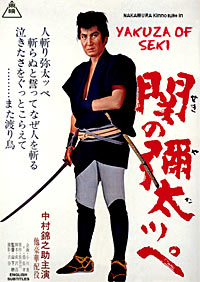

 As the story opens, an eleven year old girl has fallen into a raging river. A passing traveler, Kid Yata (Kinnosuke Nakamura), leaps in & rescues her.
As the story opens, an eleven year old girl has fallen into a raging river. A passing traveler, Kid Yata (Kinnosuke Nakamura), leaps in & rescues her. Soon he finds the other traveler, who turns out to be relatively honest & returns the money at once, saying he was surprised that after he regained his own stolen money from a thief, there were fifty extra pieces of gold.
Soon he finds the other traveler, who turns out to be relatively honest & returns the money at once, saying he was surprised that after he regained his own stolen money from a thief, there were fifty extra pieces of gold. He's hired to kill a seventy year old man, who turns out to be a friend (Ryunosuke Tsukigata who plays Musashi in
He's hired to kill a seventy year old man, who turns out to be a friend (Ryunosuke Tsukigata who plays Musashi in  His sworn brother refuses & goes so far as to demand a duel. Yata reluctantly agrees, sadly killing his friend.
His sworn brother refuses & goes so far as to demand a duel. Yata reluctantly agrees, sadly killing his friend.
 Hasegawa's take on Yatappe makes has a lot of focus on the little girl who waits ten years for the return of her childhood savior. When at last he shows up to save her once again, seeing how beautiful she has become.
Hasegawa's take on Yatappe makes has a lot of focus on the little girl who waits ten years for the return of her childhood savior. When at last he shows up to save her once again, seeing how beautiful she has become.